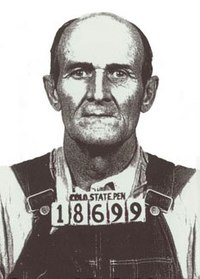Shortly after the 1937 Marijuana Tax Act went into effect on October 1, 1937, the Federal Bureau of Narcotics and Denver City police arrested Moses Baca for possession and Samuel Caldwell for dealing.
^ “The First Pot POW”. Retrieved 2011-03-18. “On the day the Marijuana Tax Stamp Act was enacted — Oct. 2, 1937 — the FBI and Denver, Colo., police raided the Lexington Hotel and arrested Samuel R. Caldwell, 58, an unemployed labourer and Moses Baca, 26. On Oct. 5, Caldwell went into the history trivia books as the first marijuana seller convicted under U.S. federal law. His customer, Baca, was found guilty of possession.”
Baca and Caldwell’s arrest made them the first marijuana convictions under U.S. federal law for not paying the marijuana tax.[19] Judge Foster Symes sentenced Baca to 18 months and Caldwell to four years in Leavenworth Penitentiary for violating the 1937 Marihuana Tax Act.
After the Philippines fell to Japanese forces in 1942, the Department of Agriculture and the U.S. Army urged farmers to grow fiber hemp. Tax stamps for cultivation of fiber hemp began to be issued to farmers. Without any change in the marijuana Tax Act, 400,000 acres (1,600 km2) were cultivated with hemp between 1942 and 1945. The last commercial hemp fields were planted in Wisconsin in 1957.
In 1967, President Johnson’s Commission on Law Enforcement and Administration of justice opined, “The Act raises an insignificant amount of revenue and exposes an insignificant number of marijuana transactions to public view, since only a handful of people are registered under the Act. It has become, in effect, solely- a criminal law, imposing sanctions upon persons who sell, acquire, or possess marijuana.”
In 1969 in Leary v. United States, part of the Act was ruled to be unconstitutional as a violation of the Fifth Amendment, since a person seeking the tax stamp would have to incriminate him/herself. In response the Congress passed the Controlled Substances Act as Title II of the Comprehensive Drug Abuse Prevention and Control Act of 1970.[23] The 1937 Act was repealed by the 1970 Act.





